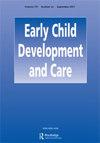Association among motor skills and fluid intelligence in children aged from 5 to 7 years with different sports skill learning
IF 0.8
4区 心理学
Q3 EDUCATION & EDUCATIONAL RESEARCH
引用次数: 0
Abstract
ABSTRACTThis study aimed to investigate the relationship between motor skills and fluid intelligence in children aged 5–7 years. In this cross-sectional study, 115 children between 5 and 7 years of age (preschool children with sports skill learning) were included (51 boys, 44.34%), and fluid intelligence was measured using the Wide Range of Intelligence Test; motor skills were assessed via the Bruininks-Oseretsky Test of Motor Proficiency-Second Edition Gross Motor Record Form (BOT-2). Motor skills differed significantly among different sports skill learning groups. A significant positive relationship was found between fluid intelligence and bilateral coordination (β = 0.196, p = 0.030) and balance (β = 0.556, p = 0.000), whereas no significant correlation was found between fluid intelligence and running speed and agility (β = 0.026, p = 0.737). In conclusion, two motor skill components (bilateral coordination and balance) were related to fluid intelligence in 5–7-year-old children with sports skill learning, implying that they may be valuable indicators of fluid intelligence.KEYWORDS: Motor skillsfluid intelligencepreschool children AcknowledgementsWe are grateful to all the teachers, preschool children, and parents who made this study possible.Disclosure statementNo potential conflict of interest was reported by the author(s).Additional informationFundingThis work was supported by The Ministry of Education of the China Liberal Arts and Social Sciences Foundation [grant number: 19YJA890019].Notes on contributorsHe JingDr. He Jing is a Master Supervisor in the College of Physical Education at the Shanghai Normal University. Her research focuses on theory and practice of physical education and training.Li FangfangLi Fangfang is a research staff at Shanghai Education Commission Teaching and Research Office, Her research focuses on physical education teaching and student physical development.Xue YuanDr. Xue Yuan is an Professor and Master Supervisor in the College of Physical Education at the Shanghai Normal University. His research focuses on theory and practice of school physical education.Ma RuiDr. Ma Rui is an Professor and Doctoral Supervisor in the College of Physical Education at the Shanghai Normal University. Her research focuses on theory and practice of Exercise and health for preschool children.5 ~ 7岁不同运动技能学习儿童运动技能与流体智力的关系
摘要本研究旨在探讨5-7岁儿童运动技能与流体智力的关系。本横断面研究纳入115名5 - 7岁儿童(学龄前运动技能学习儿童)(51名男孩,44.34%),采用宽范围智力测验测量流体智力;采用bruinink - oseretsky动作熟练程度测验-第二版大动作记录表(BOT-2)评估运动技能。不同运动技能学习组的运动技能差异显著。流体智力与双侧协调性(β = 0.196, p = 0.030)和平衡性(β = 0.556, p = 0.000)呈显著正相关,与跑步速度和敏捷性无显著相关(β = 0.026, p = 0.737)。综上所述,两项运动技能(双侧协调和平衡)与5 - 7岁运动技能学习儿童的流体智力相关,暗示它们可能是有价值的流体智力指标。关键词:运动技能;流动智力;学龄前儿童感谢所有使本研究成为可能的教师、学龄前儿童和家长。披露声明作者未报告潜在的利益冲突。本研究得到教育部人文社会科学基金资助[批准号:19YJA890019]。投稿人简评:何静,上海师范大学体育学院硕士生导师。主要研究方向为体育教育与训练的理论与实践。李芳芳,上海市教委教研室研究员,主要研究方向为体育教学与学生身体发育。雪YuanDr。薛源,上海师范大学体育学院教授、硕士生导师。主要研究方向为学校体育理论与实践。马RuiDr。马锐,上海师范大学体育学院教授,博士生导师。主要研究方向为学前儿童运动与健康的理论与实践。
本文章由计算机程序翻译,如有差异,请以英文原文为准。
求助全文
约1分钟内获得全文
求助全文

 求助内容:
求助内容: 应助结果提醒方式:
应助结果提醒方式:


